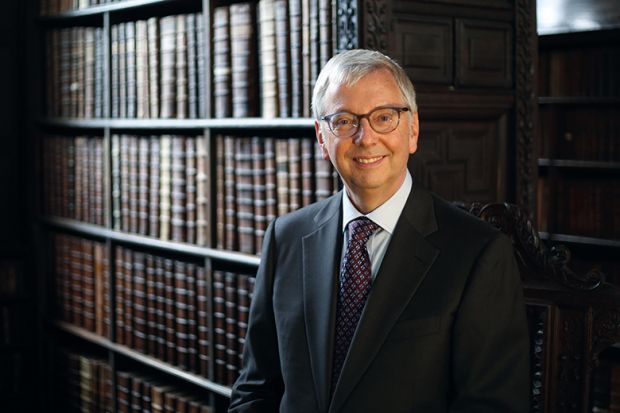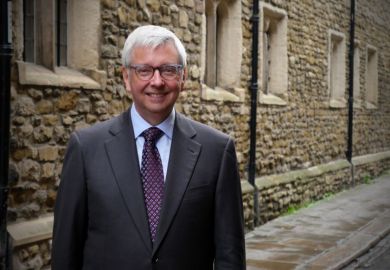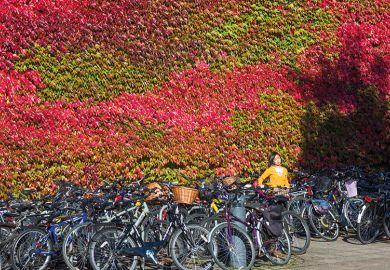The University of Cambridge’s new vice-chancellor has said that he understands public anger at the high salaries paid to UK university heads.
In an interview with Times Higher Education, Stephen Toope, a Canadian legal scholar who is the first non-Briton to lead the university in its 808-year history, said he was unsurprised that he had already faced criticism for his “very comfortable” annual salary, which he revealed is £365,000 – more than the £349,000 paid to his predecessor Sir Leszek Borysiewicz, though less than the figure in excess of £400,000 predicted by recent media reports.
“I get where people are coming from – a lot of people are struggling to make ends meet and they question the salaries [paid] in different walks of life,” said Professor Toope, who was formerly director of the Munk School of Global Affairs at the University of Toronto, having been president and vice-chancellor of the University of British Columbia between 2006 and 2014.
However, Professor Toope, a Harvard University graduate who received his PhD from Trinity College, Cambridge in 1987, defended his remuneration, saying that he was “not a glorified super-professor”.
Professor Toope said that he is ultimately responsible for all the numerous activities of an organisation with a “£1 billion turnover, 11,000 staff and 19,000 students".
“There is a sense – in the words of [US president] Harry S. Truman – that the bucks stops here,” he said. “I have talked with CEOs and politicians. Many say ‘I would not take your job whatever the pay was’. It is a difficult and pretty relentless job.”
Asked about Brexit, which, according to one senior Cambridge academic, Ross Anderson, may cost the university as much as £100 million a year, Professor Toope said it was vital that the UK – which he described as “a magnet for talent” – remains as open and welcoming as possible after it leaves the European Union.
“I really hope the government will find a way to ensure the rights of EU students and staff who live in the UK,” said the 59-year-old human rights academic, who added that he would be lobbying to ensure international students were removed from net immigration targets.
“Cambridge is an exciting place to work, but if staff are uncertain about how they and their families will be treated, when they start to feel they are not part of society, we will start to see an erosion of talent."
That is particularly applicable to the university’s 4,000-strong cohort of postdoctoral researchers, of whom 36 per cent are non-UK EU nationals, said Professor Toope.
“With PhD students, postdocs are the engine of research,” he said. “It worries me if these wonderful postdocs are not made to feel they have a future here."
With Cambridge’s reputation for world-class research as strong as ever – it was ranked second in THE’s World University Rankings 2018 last month behind the University of Oxford, and secured its latest Nobel prize when biologist Richard Henderson shared the 2017 chemistry award last week – what kind of legacy or signature achievement is Professor Toope targeting for his time in office?
Although he is “somewhat doubtful about the idea of an individual legacy for vice-chancellors”, creating a “collection of leadership across the university and seeing it as supremely talented and joined up as possible” is one aim. Another, however, is that Cambridge should be “increasingly open – to international collaboration, to talent from all around the world, to students who come from backgrounds that historically would not have given them access to Cambridge”.
On the issue of diversifying Cambridge’s student intake, Professor Toope said that he “would not have wanted to come here unless I believed the university was truly committed to this”.
“My whole academic and personal background is rooted in these beliefs – it is just part of me,” he explained, because no one from his school had ever applied to Harvard.
Harvard – “which transformed my life as great universities can for undergraduates” – was suggested by his drama teacher, but, even when he was accepted, it was clear that his adoptive parents would struggle to pay the tuition fees, he recalled. Tragedy would later befall his family when his parents were brutally murdered by three teenagers in a random attack in their Montreal home in 1995. At a graduation ceremony in 2009, Professor Toope spoke of his wish not to let the attackers “destroy the memory of his parents who lived rich and gentle lives”.
“They were wonderful people and had almost no money, but said they would do almost anything to make this happen for me, but then I got a call saying I had a scholarship,” he told THE. “I would not have been able to go to any of the universities I went to without scholarships,” he said, adding: “I hope, together with our colleges, that we can make continued and real progress.”
Register to continue
Why register?
- Registration is free and only takes a moment
- Once registered, you can read 3 articles a month
- Sign up for our newsletter
Subscribe
Or subscribe for unlimited access to:
- Unlimited access to news, views, insights & reviews
- Digital editions
- Digital access to THE’s university and college rankings analysis
Already registered or a current subscriber?







